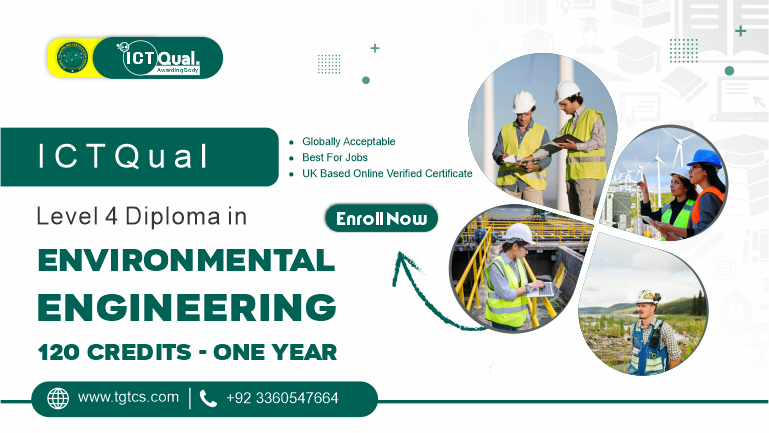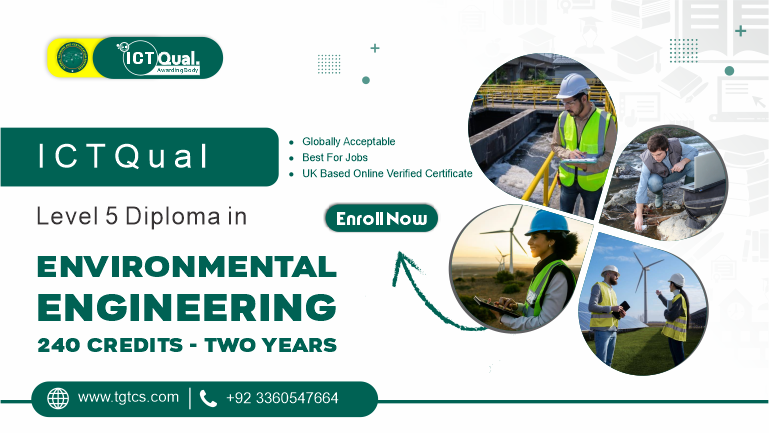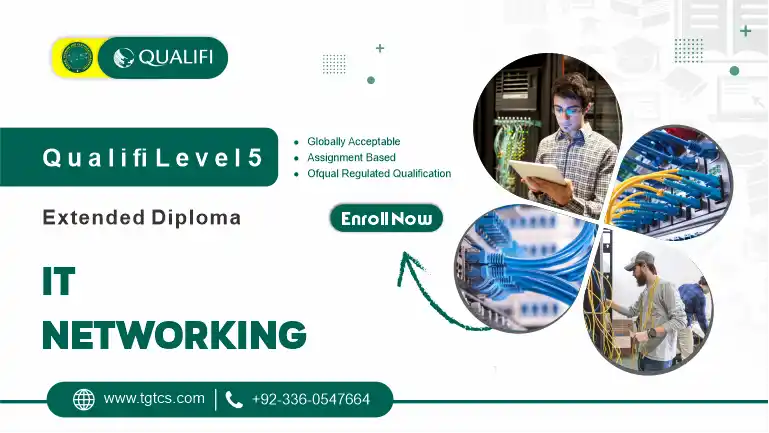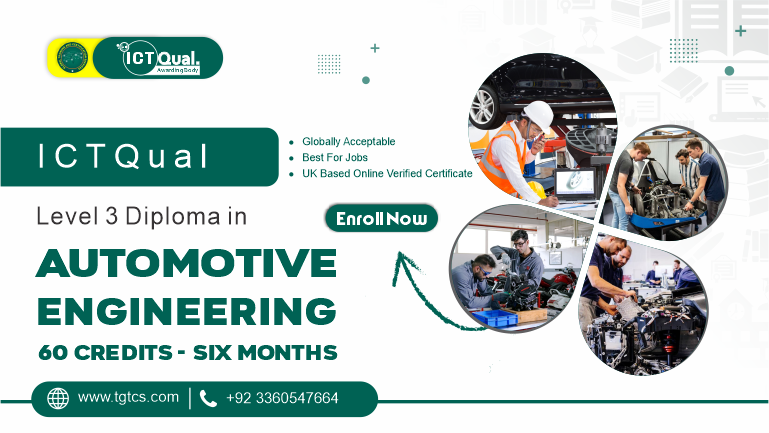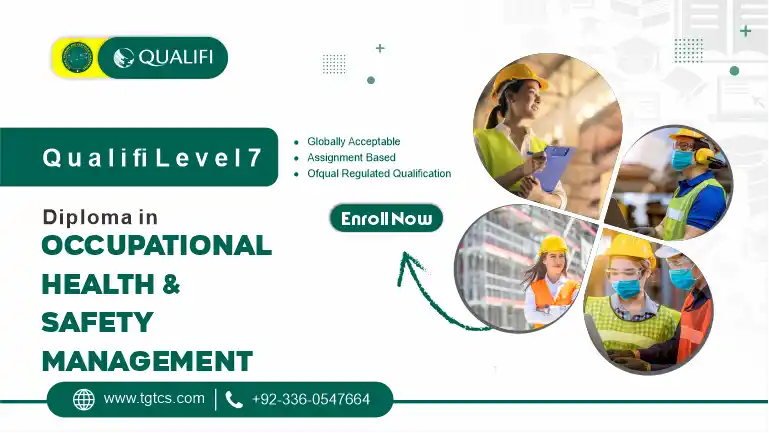ICTQual Level 4 Diploma in Environmental Engineering 120 Credits – One Year
The ICTQual Level 4 Diploma in Environmental Engineering is a specialized course that equips students with the knowledge and skills needed to pursue a successful career in this dynamic field. With 120 credits earned over one year, this comprehensive program is designed for those eager to make a significant impact on global environmental challenges.
he ICTQual Level 4 Diploma in Environmental Engineering is a nationally recognized qualification that focuses on the application of engineering principles to solve environmental problems. The course is structured to provide in-depth knowledge across various environmental disciplines, including waste management, renewable energy systems, water resources management, and environmental sustainability.
This one-year course, consisting of 120 credits, covers both theoretical and practical aspects of environmental engineering, ensuring you gain the skills needed to excel in this fast-growing field. Whether you’re aiming to work for government agencies, private companies, or NGOs, this diploma provides a solid foundation for career progression in environmental engineering.
The ICTQual Level 4 Diploma in Environmental Engineering is an exceptional opportunity for those seeking to develop a career in the growing field of environmental engineering. With its practical curriculum, flexible learning pace, and industry recognition, it is an excellent choice for anyone dedicated to making a positive environmental impact.
The Global Training and Certification Services (TGTCS) is Directly Approved Training Centre of ICTQual
The ICTQual Level 4 Diploma in Environmental Engineering is a one-year program designed to provide students with comprehensive knowledge and practical skills in environmental engineering. The course, worth 120 credits, covers key areas such as sustainable design, water resource management, renewable energy systems, and environmental impact assessments.
It is ideal for individuals looking to pursue careers in environmental consulting, sustainability, waste management, and more. With a curriculum developed in collaboration with industry experts, the diploma ensures students are equipped with the necessary skills to address global environmental challenges and excel in the growing environmental engineering sector.
Mandatory Units
The Units of Level 4 Diploma in Environmental Engineering 120 Credits – One Year are as ;
- Introduction to Environmental Engineering
- Environmental Impact Assessment
- Water and Wastewater Treatment
- Air Quality and Pollution Control
- Solid Waste Management and Recycling
- Renewable Energy Systems
- Sustainable Engineering Practices
- Environmental Regulations and Policies
- Climate Change and Environmental Risk Management
- Soil and Groundwater Contamination
- Environmental Project Management
- Advanced Topics in Environmental Engineering
The ICTQual Level 4 Diploma in Environmental Engineering provides learners with essential knowledge and practical skills to tackle the pressing environmental challenges of today. Upon successful completion, learners will demonstrate the following learning outcomes for each study unit:
- Introduction to Environmental Engineering (10 Credits)
- LO1: Understand the basic principles of environmental engineering and its role in addressing environmental challenges.
- LO2: Identify key environmental issues and their impacts on ecosystems, human health, and society.
- LO3: Demonstrate knowledge of global environmental policies, laws, and regulations that guide engineering practices.
- LO4: Explain the importance of sustainability and its integration into engineering design and solutions.
- Environmental Impact Assessment (10 Credits)
- LO1: Understand the significance of Environmental Impact Assessments (EIA) in project planning.
- LO2: Identify and apply methods and tools for conducting EIAs.
- LO3: Evaluate the potential environmental, social, and economic impacts of engineering projects.
- LO4: Interpret and comply with legal and ethical considerations in environmental assessments.
- Water and Wastewater Treatment (10 Credits)
- LO1: Understand the principles and processes of water and wastewater treatment.
- LO2: Design water treatment systems and select appropriate treatment technologies.
- LO3: Assess the effectiveness and sustainability of wastewater treatment methods.
- LO4: Apply environmental regulations in managing water quality and wastewater discharge.
- Air Quality and Pollution Control (10 Credits)
- LO1: Identify air pollutants and their sources.
- LO2: Evaluate the impacts of air pollution on human health and the environment.
- LO3: Understand and apply air pollution control technologies and strategies.
- LO4: Monitor air quality and implement corrective measures when necessary.
- Solid Waste Management and Recycling (10 Credits)
- LO1: Analyze the principles of sustainable solid waste management and disposal methods.
- LO2: Evaluate and apply recycling and waste minimization strategies across various sectors.
- LO3: Design and manage waste management systems in compliance with environmental regulations.
- LO4: Understand the environmental benefits of circular economy principles in waste management.
- Renewable Energy Systems (10 Credits)
- LO1: Understand various renewable energy sources and their potential environmental impacts.
- LO2: Evaluate the feasibility and design renewable energy systems for diverse applications.
- LO3: Analyze the integration of renewable energy systems into existing infrastructure.
- LO4: Identify the environmental benefits and challenges of renewable energy technologies.
- Sustainable Engineering Practices (10 Credits)
- LO1: Apply sustainable engineering design principles.
- LO2: Evaluate the environmental impacts of engineering projects and implement sustainable practices to mitigate these effects.
- LO3: Apply strategies for energy efficiency, resource conservation, and eco-friendly design.
- LO4: Use life cycle assessments to support sustainable decision-making in engineering projects.
- Environmental Regulations and Policies (10 Credits)
- LO1: Understand the role of environmental policies and regulations in guiding engineering practices.
- LO2: Identify and analyze global, regional, and local environmental laws and standards.
- LO3: Evaluate the impact of compliance with environmental regulations on engineering projects.
- LO4: Apply regulations in the design, implementation, and monitoring of engineering solutions.
- Climate Change and Environmental Risk Management (10 Credits)
- LO1: Understand the science of climate change and its environmental, social, and economic impacts.
- LO2: Evaluate strategies to mitigate climate change impacts within the engineering context.
- LO3: Apply environmental risk management techniques to assess and minimize the impact of climate change on infrastructure.
- LO4: Develop and implement adaptation strategies to enhance climate change resilience in engineering projects.
- Soil and Groundwater Contamination (10 Credits)
- LO1: Understand the causes, types, and effects of soil and groundwater contamination.
- LO2: Assess the risks associated with soil and water pollution and their impacts on human health and the environment.
- LO3: Apply remediation techniques to clean up contaminated sites.
- LO4: Evaluate the effectiveness of contamination control measures and monitor soil and groundwater quality.
- Environmental Project Management (10 Credits)
- LO1: Understand project management principles within the context of environmental engineering.
- LO2: Plan, execute, and evaluate environmental engineering projects in compliance with regulatory and sustainability requirements.
- LO3: Manage project risks, timelines, budgets, and stakeholders to ensure successful outcomes.
- LO4: Communicate effectively with project teams, clients, and regulatory bodies.
- Advanced Topics in Environmental Engineering (10 Credits)
- LO1: Understand emerging trends and advanced technologies in environmental engineering.
- LO2: Analyze case studies of complex environmental engineering challenges and solutions.
- LO3: Evaluate the integration of new technologies in addressing modern environmental issues like smart cities and sustainable infrastructure.
- LO4: Research and explore innovative solutions to tackle ongoing environmental challenges.
Industry-Relevant Skills: The ICTQual Level 4 Diploma in Environmental Engineering equips students with the practical and technical skills needed to address real-world environmental challenges. The course content is designed to meet industry standards, ensuring that learners are well-prepared for careers in the fast-growing environmental sector.
Comprehensive Curriculum: With a wide-ranging curriculum that covers essential topics such as water and wastewater treatment, air quality control, renewable energy systems, waste management, and environmental regulations, students gain a holistic understanding of environmental engineering. This comprehensive knowledge prepares them for diverse roles in the field.
One-Year Duration: The course is designed to be completed within one year, making it an efficient option for those looking to quickly advance in their career or further their education in environmental engineering. This condensed timeframe allows students to gain substantial expertise without long-term commitment.
120 Credits Qualification: Upon successful completion, students earn 120 credits, a valuable qualification that can enhance their employability and open doors to further study or professional certifications. The credits are transferable, providing flexibility for learners seeking to progress academically or professionally.
Hands-On Learning: The program emphasizes practical learning through case studies, projects, and real-world scenarios. Students will have the opportunity to apply theoretical knowledge in practical settings, developing the problem-solving and decision-making skills required for a successful career in environmental engineering.
Career Opportunities: Graduates of this diploma are well-positioned for a wide range of career opportunities in environmental engineering, including roles such as environmental consultants, sustainability officers, water treatment engineers, waste management specialists, and more. The demand for skilled professionals in environmental engineering continues to rise as global environmental concerns intensify.
Expert-Led Teaching: The course is delivered by experienced instructors with extensive knowledge of environmental engineering. Students benefit from their expertise and industry insights, gaining valuable mentorship and guidance throughout their studies.
Global Perspective: The curriculum is designed to address both local and global environmental issues, providing students with a broad understanding of environmental policies, laws, and regulations. This global perspective enhances the ability to work on international projects and collaborate with professionals worldwide.
Focus on Sustainability: Sustainability is a core theme throughout the course, ensuring that students are equipped to design and implement solutions that minimize environmental impact. This focus on sustainable practices is essential as industries and governments prioritize environmentally responsible approaches to engineering and development.
Pathway to Advanced Studies: The ICTQual Level 4 Diploma provides a solid foundation for further education, including the possibility of advancing to a higher-level qualification or degree in environmental engineering or related fields. It also prepares students for certifications from professional bodies in the environmental sector.
Compliance with Environmental Standards: The course emphasizes understanding and adhering to environmental laws and regulations, preparing students to design and implement projects that comply with international standards. This knowledge ensures that graduates can contribute effectively to sustainable practices and environmental protection.
Increased Employability: By completing this diploma, students gain a competitive edge in the job market. The combination of in-depth technical knowledge, practical experience, and a globally recognized qualification significantly boosts employability in the growing field of environmental engineering.
The ICTQual Level 4 Diploma in Environmental Engineering is ideal for individuals who are passionate about environmental issues and want to make a meaningful impact through engineering solutions. The ideal learner for this course is someone who meets the following criteria:
- Interest in Environmental Sustainability: The ideal learner is motivated by a desire to address global environmental challenges, such as climate change, pollution, and resource depletion. They are interested in using engineering principles to create sustainable solutions that benefit both the environment and society.
- Background in Science or Engineering: While this course is accessible to individuals with various academic backgrounds, it is particularly suited for those with prior knowledge in science, engineering, or a related field. A foundation in subjects such as biology, chemistry, physics, or civil engineering will help learners grasp key concepts and technical material more effectively.
- Career-Focused Individuals: This diploma is perfect for individuals looking to advance or pivot their career in the environmental engineering field. The ideal learner is someone who seeks professional growth and aims to secure roles in environmental consultancy, waste management, sustainability, renewable energy, or water resources management.
- Critical Thinkers and Problem Solvers: The ideal learner should be analytical, with a strong ability to assess environmental problems and devise practical, sustainable solutions. They should enjoy solving complex challenges and applying theoretical knowledge to real-world situations.
- Goal-Oriented and Motivated: This course requires a commitment to learning and personal development. The ideal learner is driven and determined to complete the diploma within its one-year timeframe. They have the ambition to use their qualification to enhance their career opportunities in a growing and impactful industry.
- Detail-Oriented and Regulatory-Savvy: Environmental engineering requires a deep understanding of regulations, standards, and sustainability practices. The ideal learner is meticulous, pays attention to detail, and has an interest in understanding and applying environmental laws and regulations to ensure compliance in engineering practices.
- Hands-On and Practical Learners: Since this course involves significant practical application through projects, case studies, and real-world scenarios, the ideal learner is someone who enjoys learning by doing. They are eager to gain hands-on experience that will equip them to tackle environmental challenges in their professional careers.
- Future-Focused and Open to Innovation: The environmental engineering field is constantly evolving with new technologies and methods. The ideal learner is forward-thinking, open to embracing emerging trends such as renewable energy, smart cities, and sustainable infrastructure, and is eager to stay updated with new developments in the field.
- Individuals Seeking Global Perspective: The course provides a global perspective on environmental issues and solutions. The ideal learner is someone who is open to understanding how environmental engineering practices can vary across regions and is interested in contributing to international projects aimed at solving global environmental issues.
- Collaborative and Effective Communicator: Environmental engineering often involves working in teams or with clients, regulatory bodies, and other stakeholders. The ideal learner is someone who enjoys collaborating with others, communicates effectively, and is prepared to take on leadership or team roles in project management.
This course is well-suited for anyone who is passionate about using engineering to build a sustainable future and is eager to take the next step in their career in environmental engineering.
Progression Routes
The ICTQual Level 4 Diploma in Environmental Engineering serves as an ideal foundation for individuals seeking to advance their careers in the environmental engineering field. Graduates of this qualification will have a strong understanding of environmental issues, engineering solutions, and regulatory frameworks, making them well-equipped for various roles. Upon successful completion, graduates have multiple pathways for further academic study and career advancement.
1. Further Education
Graduates wishing to deepen their knowledge and expertise in environmental engineering can explore several higher education options:
- Bachelor’s Degree in Environmental Engineering: Many universities offer top-up programs for those holding a Level 4 diploma, enabling them to complete a full Bachelor’s degree. This provides an opportunity to delve deeper into complex environmental systems, design principles, and advanced engineering technologies.
- Bachelor’s Degree in Sustainable Engineering: For those passionate about sustainability, pursuing a degree in Sustainable Engineering can expand skills in developing green technologies, renewable energy systems, and sustainable building practices.
- Postgraduate Studies: Graduates can also pursue postgraduate studies, including Master’s programs in Environmental Engineering, Environmental Management, or Renewable Energy. These advanced qualifications allow for specialization in areas like climate change, air quality management, or environmental policy.
2. Career Progression
Graduates of the ICTQual Level 4 Diploma in Environmental Engineering are prepared for a wide variety of roles in the environmental and engineering sectors. Potential career paths include:
- Environmental Consultant: Graduates can work as consultants, assessing and advising businesses on how to minimize their environmental impact. This may involve conducting environmental impact assessments, designing waste management strategies, and ensuring compliance with environmental laws.
- Sustainability Manager: In this role, graduates manage sustainability initiatives within organizations, designing programs to reduce environmental footprints, optimize energy usage, and promote eco-friendly practices across industries.
- Water Resources Engineer: Specializing in water supply and wastewater systems, graduates ensure clean water availability, manage wastewater treatment, and implement sustainable water resource practices.
- Renewable Energy Engineer: Focusing on clean energy solutions, graduates can design and implement renewable energy systems, including solar, wind, hydroelectric, and geothermal power solutions.
- Waste Management Specialist: Graduates can work in waste management, designing waste reduction programs, managing recycling operations, and overseeing sustainable landfill practices.
- Environmental Health and Safety Officer: This role involves ensuring compliance with environmental and safety regulations. Graduates can work across various industries, including manufacturing, construction, and government, to monitor and mitigate environmental risks.
3. Industry Certifications and Professional Development
Graduates seeking to enhance their employability or specialize in specific areas can pursue additional industry certifications and professional qualifications, such as:
- Chartered Environmentalist (CEnv): Awarded by the Society for the Environment, this designation recognizes professionals who have made significant contributions to environmental management and sustainability. A Level 4 qualification serves as a strong foundation for pursuing this accreditation.
- Certified Energy Manager (CEM): Graduates can pursue certifications in energy management to specialize in optimizing energy systems and reducing energy consumption in various industries.
- LEED Accreditation (Leadership in Energy and Environmental Design): Graduates interested in green building and construction projects can earn LEED accreditation to manage sustainability in building design and construction effectively.
4. Employment Opportunities
Graduates can explore a wide range of employment opportunities across multiple sectors, including:
- Government and Regulatory Bodies: Opportunities exist within public sector organizations like environmental protection agencies or local councils, where graduates can help enforce regulations and develop policies to promote sustainability.
- Private Sector: Numerous private companies are seeking environmental engineers to improve sustainability practices. Graduates can work in industries such as construction, energy, utilities, or transport to minimize the environmental impact of business operations.
- Non-Profit Organizations (NGOs): Environmental advocacy groups and NGOs often require skilled environmental engineers for policy advocacy, environmental protection initiatives, and community education projects.
- Consulting Firms: Environmental engineering consulting firms hire graduates to assist in a variety of projects, from environmental assessments to creating sustainability strategies for businesses.
5. Entrepreneurship and Consultancy
For entrepreneurial graduates, the growing demand for sustainability solutions provides an opportunity to start their own environmental consulting firms. These firms can offer services such as environmental impact assessments, sustainable design, waste management, and regulatory compliance. Environmental engineering consultants are highly sought after to help businesses reduce their environmental footprint and meet sustainability goals.
Course Overview
Course Level
Level 4
Course Units
12 Mandatory Units
Duration
one year
